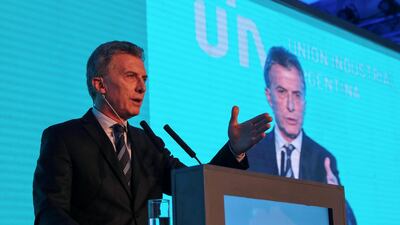The International Monetary Fund chief said it has made progress in talks with Argentinian officials towards strengthening the country’s $50 billion IMF-backed economic plan, “in the face of renewed financial volatility”.
“We made progress in our meeting and we will be working together to further strengthen the Argentine authorities’ IMF-backed programme,” Ms Lagarde said in a statement on Tuesday night.
“Our discussions will now continue at a technical level and, as stated before, our common objective is to reach a rapid conclusion to present a proposal to the IMF Executive Board.” The meetings are to continue on Wednesday.
The IMF last week agreed to revise the terms of its $50 billion Argentina bailout package after the peso plunged to a record low against the dollar and Argentinian president Mauricio Macri made a public plea for the lender to speed up distribution of the money.
The IMF distributed in June $15bn, the first tranche of the 2019 financing programme for Argentina.
The Argentinian peso has weakened by about 24 per cent against the dollar since the start of the month and more than 53 per cent of its value since the beginning of the year to trade at 38.95 to the dollar on Wednesday morning. It was worth around 18 to the dollar at the start of the year.
Meanwhile, inflation in Argentina has exceeded 25 per cent and left many citizens struggling. Hundreds of people took part in protests in Buenos Aires on Monday.
_______________
Read more:
IMF and Argentina to meet on Tuesday in hope of averting economic collapse
Argentina's $50bn loan talks with IMF on right track
Argentina hikes interest rate to one of the world's highest amid falling peso
_______________
Following the meeting in Washington between the IMF, Argentina’s economy minister Nicolas Dujovne, and Central Bank deputy governor, Gustavo Cañonero, Argentina’s government said it hoped the IMF would agree in the second half of September to a deal giving the country more financial support as it faces a deepening economic crisis.
In an effort to stem the decline, Argentina’s Central Bank last week hiked its benchmark interest rate to 60 per cent from 45 – one of the world’s highest – but the measure proved fruitless as the peso shed a further 13.5 per cent by close of play.
The day before the Washington talks, President Macri announced plans to halve the number of government ministries and reinstate a tax on grain exports to bring budget deficits under control. At the current exchange rate, the move would put an extra $7.1bn in state coffers, according to Reuters.
The president, who is known to be market-friendly, appealed to wealthy Argentinian exporters to cooperate and understand the reasons behind such tough new fiscal measures.
“We know this is a bad tax, but I have to ask them to understand that it is an emergency and we need their contribution,” Mr Macri said in a televised address on Monday. “We must move a lot faster.”

